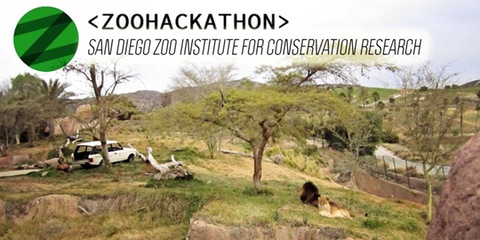
Over the October 7-9 weekend, a small group of programmers participating in the inaugural Zoohackathon had the opportunity to go behind the scenes at the San Diego Zoo Safari Park and see firsthand some of the species the San Diego Zoo Global has rescued from illegal wildlife trade. “The zookeepers brought out two monitor lizards that were brought into the United States illegally and confiscated,” said Utkrisht Rajkumar, a third year computer engineering major at the University of California San Diego. “It added a lot of context to the problems that we were trying to solve.”
 The group hunkered down for the weekend for a two-day invention session aimed at developing usable solutions to problems solicited from wildlife experts around the world. Leading conservation technology zoos in the U.S., UK, Asia and the Pacific are running similar events.
The group hunkered down for the weekend for a two-day invention session aimed at developing usable solutions to problems solicited from wildlife experts around the world. Leading conservation technology zoos in the U.S., UK, Asia and the Pacific are running similar events.
At the end of the weekend, teams pitched their ideas to an expert panel of judges. The first-ever San Diego Zoohackathon took place at the Institute for Conservation Research in Escondido, Calif.
One of those problems presented to the participants is that many illegal wildlife products, such as rosewood from protected forest habitats or ivory figurines made from elephant tusks, are confiscated upon arrival in the United States, and often the intent of the traveler isn’t criminal. With this information in mind, Rajkumar and his team decided to make a website and mobile app called Safe Souvenirs to educate international travelers about which products will be confiscated if they buy them and later try to travel with them. The website can be accessed from airport kiosks before going through security.
 Rajkumar (far left) and computer science classmate Joshric Aurea (near left) hooked up with UC San Diego alumni Shannon Chamberlin (Ed.D., Teaching and Learning, ’14) and Alicia Johal (BS, Biology, ’10) at the event on Friday night, after learning that Chamberlin’s brother-in-law, also present at the event, had experience with iOS app development.
Rajkumar (far left) and computer science classmate Joshric Aurea (near left) hooked up with UC San Diego alumni Shannon Chamberlin (Ed.D., Teaching and Learning, ’14) and Alicia Johal (BS, Biology, ’10) at the event on Friday night, after learning that Chamberlin’s brother-in-law, also present at the event, had experience with iOS app development.
“Getting to work alongside industry professionals was really special because we got a different perspective,” said Rajkumar, who previously participated in a student hackathon in 2015. “We wanted to come up with a solution that has impact right off the bat.”
They’ll have that chance – Rajkumar’s team came in a close second, behind Wild Track, a team consisting of Fab Lab personnel and Accel Robotics co-founder and UC San Diego alumnus Nick Morozovsky (Ph.D., Mechanical Engineering, ’14).
Morozovsky’s team sought to improve upon a software tool known as Spatial Monitoring and Reporting Tool, or SMART, the most widely adopted solution for managing law enforcement, ecological monitoring and intelligence in protected areas. While SMART does extremely well at capturing the data collected by rangers and conservationists, no solution exists to support local communities in reporting critical information such as poaching incidents, intelligence on poachers, wildlife trafficking and details of human-wildlife conflict.
"Many residents of protected areas don't have smart phones," said Morozovsky. "We created a system in which a user can report illegal activity by sending an SMS text message to a number we selected, and the content will be analyzed for language and keywords. The data will then be imported into an existing database for law enforcement."
The judges selected Wild Track as the winning hack because it addressed the problem at a deeper level, is both sustainable and scalable, and user-friendly. Both Wild Track and Safe Souvenirs won a private behind-the-scenes tour of the San Diego Zoo Safari Park.
Read the complete article on the Jacobs School of Engineering website.

